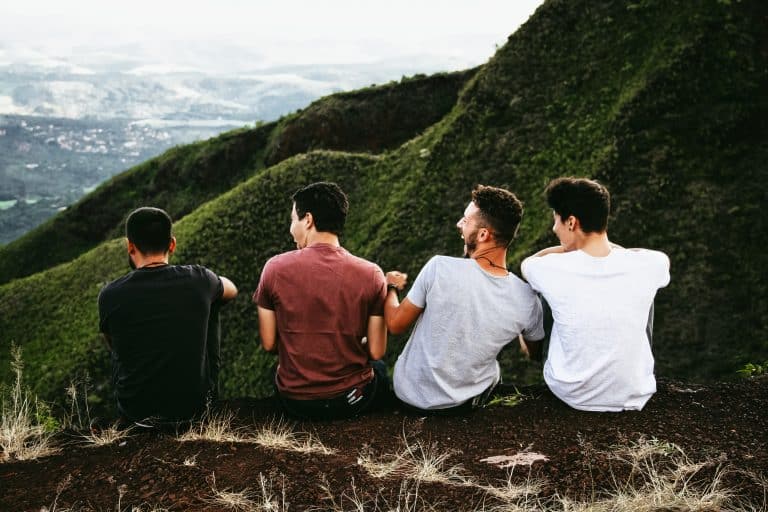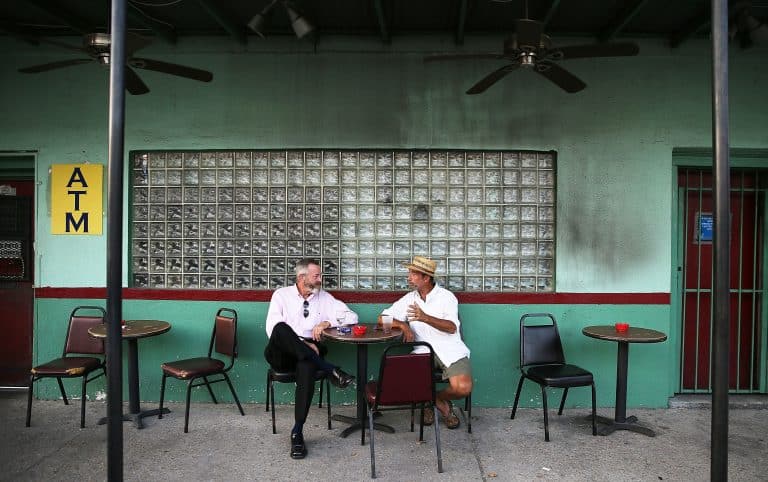
Image by Matheus Ferrero, Public Domain Dedication (CC0).
How Tender, Loving Male Friendships Can Save Us from Toxic Masculinity
The ringing always started ten minutes after 3:00 — permission for my friends and me to depart the classroom toward the real epicenter of our high school lives: a nearby suburban home, cradled by mountains, on the precipice of Utah’s Little Cottonwood Canyon.
Sunflower shells littered carpet and crevice; obscenities floated in space as the sounds of Super Smash Bros played in the background; chana masala (magically) disappeared from the fridge.
We transformed in this home and shared our full, flawed, and complex selves with each other. I am grateful for a feeling and quality of interaction that existed then, one I now find uncommon: deep platonic love and tenderness between men.
I remember high school as a time of countless hugs, “I love you, man”s, and bodies as the soft places to lounge and rest. We made pillow forts that turned into cozy pillow nests when we watched Space Jam and Pokemon 2000. We made room for each other’s raw and tender emotions. We articulated feelings, starting to examine the contours of our inner emotional landscapes. This included difficult terrain: the hurt and messiness of mental health struggles and parental strife. It included beautiful things too — expressions of love and joy and possibility when it came to the music and art that sang to our souls.
I’ve seen a lot of essays lately about the lack of options for boys’ emotional lives — so I’m grateful for what my friends and I had. In this new period of my adult life, I am drawn to these moments. I am no longer in high school, no longer in college, and constantly reminded that there are no mountains in Minneapolis. While nostalgia is common when one enters a new phase — adapting to new environments and building a sense of home is difficult — my longing comes from a different source. The tenderness I found in my earlier male friendships is missing. The more friendships I attempt as an adult, the more I learn that we are increasingly alienated from how we were as boys. As we’ve aged, the options for acceptable male behavior have dwindled, and I sense that this is part of the tragedy of masculinity that takes greater hold in adulthood.
As a culture, we value different things in men than we do in boys. The therapist John Bradshaw writes that traits often admired in adult men include “power, control, secrecy, fear, shame, isolation, and distance.” Our societal model of adult masculinity values stoicism and discourages expression. We ask men to adopt callousness, to avoid feeling, and to neglect responsibility toward others’ feelings. I find these traits undesirable, and yet, I understand why they’re so common.
Many of the conversations I’ve had with male friends about life after college revolve around how other friends have changed to conform to the expectations of their professional lives. More often than not, work environments value these traditionally masculine traits; they are understood as behaviors that lead to promotion and success. I have seen some of my male friends, who were previously more considerate, conform to these expected norms, and in the process, become more callous. I am disappointed, but I see their behavior as a natural outcome of what they’ve been taught about masculinity — that they must strive to be a breadwinner and seek wealth and prestige.
With this limited and limiting imagination, we’ve created a masculinity as lonely as hell. We deny the validity of male, platonic tenderness. This contributes to the difficulty of building male friendships as adults. In my own experience seeking adult friendship, I have made more friends who are women than men. I find this unsurprising, given the difficulty of opening up with other men without compromising some part of your masculinity.
I’ve also seen and felt an unspoken code of conduct when it comes to adult, male interactions. Even with the male friends of my friends, I am struck by the deliberate caution, the felt distance of my encounters. I notice a performative coolness that favors cynicism over sincerity — “Who gives a shit?”; “Whatever, man”; “I don’t care” — often accompanied by dismissive laughter. I want to live earnestly and expressively, and I miss the intimacy I had with my high school friends. Yet I worry that my vulnerability won’t be received well, that it will leave me isolated, excluded, and marked as “other.”
In this condition of masculine loneliness, I can see why men prioritize work, if they have it, over relationships. I understand because it’s happened to me too — friendship falling on my list of priorities and work rising. I did not feel this in my youth, and I feel a greater need to prioritize work in this state of economic precarity for millennials. My worry is often accompanied by fear of not being enough, of not being worthy, of not fulfilling standards of masculinity. How much of a breadwinner, how ironic, how hard do I need to be? I’m unsure, but I do feel that my choosing the sincere and the soft has led me to fail at “being a man.”
Personal failure’s best friends are shame and self-loathing, and I’ve spent my fair share of time with these feelings. They were, and are, difficult to navigate, but I eventually learned to find value in them. As time passed, I gained distance from their intensity, which gave me the opportunity to interrogate them. I began to understand their source, their power. I found that these feelings were tied to categories that implicitly and explicitly defined my understanding of masculinity. If they were the source of shame, how could I alter them? What would it look like to build a sustainable, holistic, reconstituted masculinity for those who identify as men?
The starting point was clear to me — the joy and life-affirming experiences that male, platonic tenderness brought me in the past. Though we are now separated by thousands of miles, I can still find this with that same group of high school friends. When the stars align and we find time to connect over Google Hangouts, I feel more whole. Our calls privilege playfulness and joy. We make nonsensical noises for no reason other than they’re fun. We tease. We speak of our struggles, our aspirations, our longings to see each other, our life-long friendships.
I had encountered different masculinities in my friendships, but it was still difficult to put form and context around these experiences, so I began to explore.
I found the work of bell hooks, a balm in my searching. In The Will to Change: Men, Masculinity, and Love, bell describes a masculine “partnership model” which “sees interbeing and interdependency as the organic relationship of all living beings.” This is a way of existing for men that prioritizes “integrity, self-love, emotional awareness, assertiveness, and relational skill, including the capacity to be empathic, autonomous, and connected.” Reading bell gave me a masculine identity to aspire toward.
I found the work of Naava Smolash, a powerful voice who names the development of these capacities “nurturance culture.” As Naava says, this is a culture that practices “self-love and love of one another” and one that is built on work “men need to do…with other men.” Naava says this work must be accountable “with and to women,” those who bear the brunt of emotional labor and the trauma that traditional masculinity often leaves in its wake. By doing so, the conditions that produce gendered violence — so common in our society — may change too. I recognized that we were starting to do this work in our Google Hangouts, but reading Naava underscored for me, that as a society, we need to do more.
Ultimately, bell and Naava’s work legitimized my experience of male tenderness. It was never an error — it was a defining part of my masculinity and human wholeness. They helped me witness the insanity of traditional standards of masculinity. They helped me affirm that I do not want a life of “power, control, secrecy, fear, shame, isolation, and distance” — this sounds like a recipe for early death, greater loneliness, and a reduced capacity to be human.
I now choose the nourishment of myself and others, instead of their diminishment. I have come to value my capacity to feel complexity, nuance, and tender emotion over fitting in, over a traditionally masculine tribe that may offer prestige but denies me my integrity. In the end, my failure to abide by the impossible, dehumanizing standards of masculinity was my liberation.
As I revisited bell hooks, something at the beginning of The Will to Change struck me:
“Every female wants to be loved by a male. Every woman wants to love and be loved by the males in her life. Whether gay or straight, bisexual or celibate, she wants to feel the love of father, grandfather, uncle, brother, or male friend.”
I felt a strange excitement reading this because I knew this desire to be true for men too. bell goes on to say that we do not name this “for fear we will be mocked, pitied, shamed” and because to recognize this desire is to note “the intensity of our lack and our loss.” I know this loss. We know this loss. Men know this loss, whether they admit it or not. But by recognizing it, we can begin to fill its void.
So let us build, let us value, and let us set the standard for a masculinity that loves and breathes — an accountable, nourishing, whole, connective masculinity that honors the integrity of self, other, community, and life in all its forms.
As we do the work to change our gender norms institutionally and societally, we can begin in the small places — with each other.

